Audi Q6 e-tron VS BMW X3
The Audi Q6 e-tron and BMW X3 represent two compelling options in the growing electric SUV market, each offering unique strengths. While the Q6 e-tron impresses with its cutting-edge technology and spacious interior, the BMW X3 is celebrated for its dynamic driving experience and robust performance. Ultimately, the choice between these two models will depend on individual preferences for style, functionality, and driving enjoyment.
Audi Q6 e-tron
The Audi Q6 e-tron represents a significant step forward in the realm of electric vehicles, offering a perfect blend of cutting-edge technology and timeless design. With its spacious interior and advanced infotainment system, it provides both comfort and connectivity for the modern driver. The Q6 e-tron embodies Audi's commitment to sustainability without compromising on performance or luxury.
detailsBMW X3
The BMW X3 stands out in the competitive SUV market with its refined blend of performance and luxury. Its interior boasts high-quality materials and a design focused on driver comfort and convenience. With a robust engine lineup, the vehicle offers a balanced driving experience that caters to both urban settings and off-road adventures.
detailsThe automotive market is rapidly evolving, especially in the SUV segment. With a surge in electric vehicle (EV) technology, the competition is fierce between renowned brands like Audi and BMW. This article delves into a detailed comparison between the Audi Q6 e-tron and the BMW X3, two prominent models that symbolize the union of performance, luxury, and innovation in the electric SUV landscape.
Power and Performance
The Audi Q6 e-tron boasts impressive power outputs ranging from 292 to 516 HP, complemented by a maximum torque of 855 Nm on higher-end models. With multiple drivetrain options, including rear-wheel and all-wheel drive, the Q6 e-tron can accelerate from 0-100 km/h in just 4.3 seconds, making it a compelling choice for speed enthusiasts.
In contrast, the BMW X3 shakes the performance landscape with its range of engine options, including diesel, petrol MHEV, and plug-in hybrid configurations. The X3's most powerful variant offers up to 510 HP, while its 0-100 km/h sprint capability peaks at an impressive 3.8 seconds. Both vehicles excel in acceleration and power delivery, appealing to a diverse range of driving preferences.
Electric Range and Efficiency
One of the key selling points of electric vehicles is their efficiency and range. The Audi Q6 e-tron offers an electric range of up to 637 km, supported by battery capacities of 75.8 kWh and 94.9 kWh. With a consumption rate as low as 15.6 kWh/100 km, the Q6 e-tron stands out for those who prioritize long-distance travel without frequent charging stops.
On the other hand, the BMW X3 provides a more traditional hybrid experience with its petrol and diesel options, alongside plug-in hybrid variants offering an electric range of up to 90 km. Although its fuel consumption varies greatly, the X3 achieves impressive efficiency with some models as low as 2.1 L/100 km. However, for those seeking a fully electric experience, the Q6 e-tron clearly outshines with its longer range capabilities.
Interior Comfort and Technology
Both models promise a luxurious interior experience, complete with high-quality materials and advanced technology. The Audi Q6 e-tron features a spacious cabin designed for maximum comfort, along with a cutting-edge infotainment system featuring dual touchscreens, voice recognition, and an array of connectivity options.
The BMW X3, renowned for its driver-oriented design, offers a similar level of sophistication. It is equipped with the latest iDrive system, enhanced by a stunning digital instrument cluster and various smart tech integrations. Both vehicles comfortably seat five, ensuring ample room for passengers and luggage on long journeys.
Safety Features and Innovations
Safety is paramount in modern SUVs, and both the Q6 e-tron and X3 incorporate advanced safety technologies. The Q6 e-tron comes standard with a comprehensive suite of driver assistance features, including adaptive cruise control, lane-keeping assist, and enhanced automatic emergency braking systems.
The BMW X3, known for its robust safety credentials, offers a similar package. BMW's Active Guard and Parking Assistant features further enhance safety and convenience. Both SUVs showcase a dedication to passenger safety, ensuring peace of mind for drivers and their families.
Conclusion: Which SUV Reigns Supreme?
Choosing between the Audi Q6 e-tron and the BMW X3 ultimately depends on consumer priorities. The Q6 e-tron shines in electric performance, range, and innovative technology, making it an ideal choice for EV enthusiasts. In contrast, the BMW X3 presents a versatile platform with various engine options and proven driving dynamics, appealing to those who appreciate traditional performance blended with modern technology.
In this fierce competition, both brands exemplify the epitome of luxury and innovation in the SUV segment. As the automotive landscape continues to transform, potential buyers can rest assured that they are choosing among the very best offerings available.
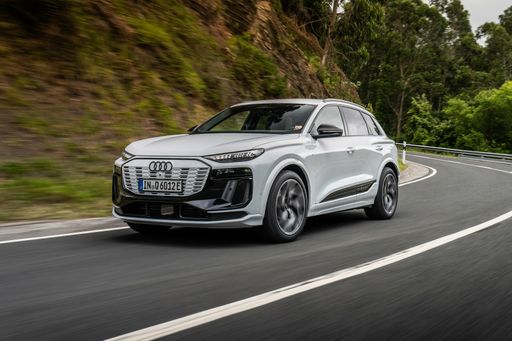 @ audi-mediacenter.com
@ audi-mediacenter.com
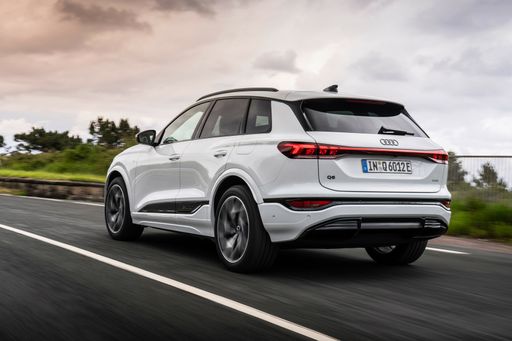 @ audi-mediacenter.com
@ audi-mediacenter.com
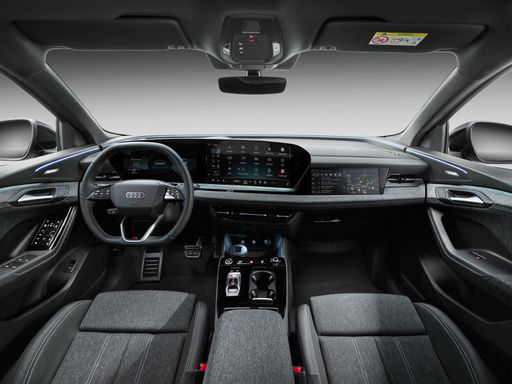 @ audi-mediacenter.com
@ audi-mediacenter.com
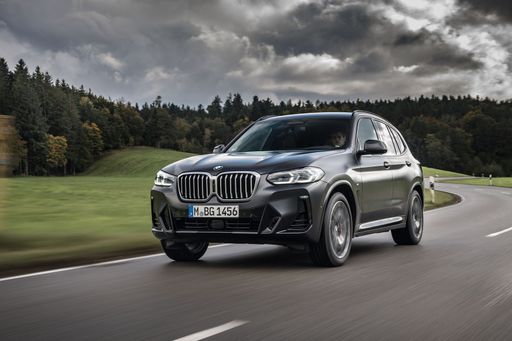 @ press.bmwgroup.com
@ press.bmwgroup.com
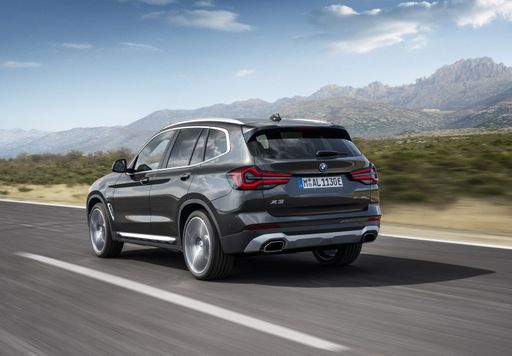 @ press.bmwgroup.com
@ press.bmwgroup.com
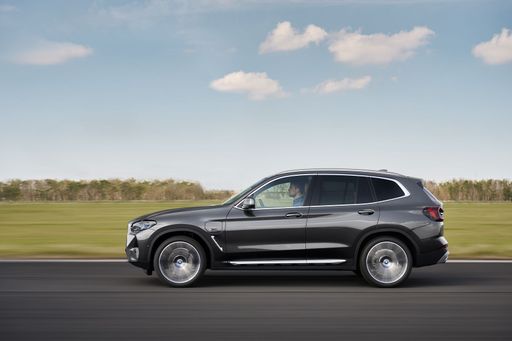 @ press.bmwgroup.com
@ press.bmwgroup.com
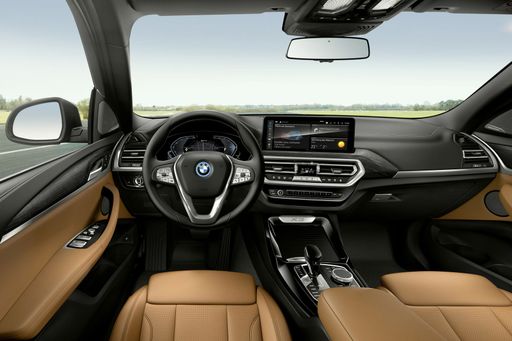 @ press.bmwgroup.com
@ press.bmwgroup.com
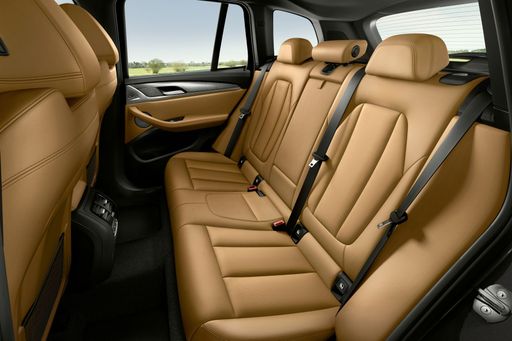 @ press.bmwgroup.com
@ press.bmwgroup.com

|

|
|
|
|
Costs and Consumption |
|
|---|---|
|
Price
about 54400 - 91900
£
|
Price
about 47900 - 90300
£
|
|
Consumption L/100km
-
|
Consumption L/100km
0.9 - 10.8
L
|
|
Consumption kWh/100km
15.6 - 18.9
kWh
|
Consumption kWh/100km
-
|
|
Electric Range
482 - 656
km
|
Electric Range
44 - 90
km
|
|
Battery Capacity
75.8 - 94.9
kWh
|
Battery Capacity
11.2 - 19.7
kWh
|
|
co2
0
g/km
|
co2
21 - 246
g/km
|
|
Fuel tank capacity
-
|
Fuel tank capacity
50 - 68
L
|
Dimensions and Body |
|
|
Body Type
SUV
|
Body Type
SUV
|
|
Seats
5
|
Seats
5
|
|
Doors
5
|
Doors
5
|
|
Curb weight
2200 - 2425
kg
|
Curb weight
1875 - 2140
kg
|
|
Trunk capacity
499 - 526
L
|
Trunk capacity
450 - 570
L
|
|
Length
4771
mm
|
Length
4708 - 4755
mm
|
|
Width
1939 - 1965
mm
|
Width
1891 - 1920
mm
|
|
Height
1665 - 1685
mm
|
Height
1660 - 1676
mm
|
|
Payload
540
kg
|
Payload
415 - 585
kg
|
Engine and Performance |
|
|
Engine Type
Electric
|
Engine Type
Diesel MHEV, Petrol MHEV, Plugin Hybrid, Petrol
|
|
Transmission
Automatic
|
Transmission
Automatic
|
|
Transmission Detail
Reduction Gearbox
|
Transmission Detail
Automatic Gearbox
|
|
Drive Type
Rear-Wheel Drive, All-Wheel Drive
|
Drive Type
All-Wheel Drive
|
|
Power HP
292 - 516
HP
|
Power HP
184 - 510
HP
|
|
Acceleration 0-100km/h
4.3 - 7
s
|
Acceleration 0-100km/h
3.8 - 8.4
s
|
|
Max Speed
210 - 230
km/h
|
Max Speed
210 - 250
km/h
|
|
Torque
450 - 855
Nm
|
Torque
300 - 700
Nm
|
|
Number of Cylinders
-
|
Number of Cylinders
4 - 6
|
|
Power kW
215 - 380
kW
|
Power kW
135 - 375
kW
|
|
Engine capacity
-
|
Engine capacity
1995 - 2998
cm3
|
|
Top speed
210 - 230
km/h
|
Top speed
210 - 250
km/h
|
General |
|
|
Model Year
2024 - 2025
|
Model Year
2023 - 2024
|
|
CO2 Efficiency Class
A
|
CO2 Efficiency Class
F, B, G, E
|
|
Brand
Audi
|
Brand
BMW
|
Audi Q6 e-tron
Introducing the Audi Q6 e-tron: A Step into the Future of Electrification
The Audi Q6 e-tron marks a significant stride forward in the electric vehicle sector, cementing Audi's commitment to innovation and sustainability. This state-of-the-art SUV combines luxury, performance, and cutting-edge technology, catering to the eco-conscious driver without compromising on power or style.
Design Meets Functionality
The Audi Q6 e-tron showcases a sleek design aesthetic common in the Audi lineage. With a length of 4771 mm, it strikes an imposing presence on the road, combining practicality with sophisticated styling. It features a spacious interior that comfortably seats five and offers a generous boot capacity of 514 to 526 litres, making it perfect for both everyday commutes and longer journeys.
Advanced Powertrain Options
The Audi Q6 e-tron comes with a variety of powertrain configurations, reflecting the brand's push towards greater innovation in electric mobility. With a power range between 292 to 516 PS and a torque spread of 450 to 855 Nm, the vehicle promises an engaging driving experience. The electric drivetrain offers two modes of propulsion: rear-wheel drive for more traditional handling and all-wheel drive for enhanced traction under diverse driving conditions.
Efficiency Meets Performance
In terms of efficiency, the Audi Q6 e-tron competes strongly, leveraging advanced battery technology to deliver a range between 482 and 637 kilometres on a single charge, depending on the model. Consumption averages between 16.2 to 18.9 kWh per 100 km, showcasing Audi's commitment to minimal environmental impact. The model's CO2 efficiency class stands at A, highlighting its eco-friendly credentials.
Innovative Technology and Features
The Q6 e-tron is equipped with a host of innovative technologies that enhance both comfort and ultimate control. The vehicle is characterised by Audi’s virtual cockpit, offering intuitive infotainment controls along with a premium sound system. Safety and driver assistance systems are state-of-the-art, incorporating adaptive cruise control, lane assist, and park assist, ensuring peace of mind on every journey.
Acceleration and Speed
A performance enthusiast's dream, the Q6 e-tron accelerates from 0 to 100 km/h in an impressive 4.3 to 7 seconds, contingent on model specification. It boasts a top speed of 210 to 230 km/h, providing the thrilling dynamics typical of Audi's high-performance vehicles.
Electric Vehicle Infrastructure
With varying battery capacities from 75.8 to 94.9 kWh, the Q6 e-tron supports fast charging, making long-distance journeys more feasible than ever before. The advanced energy recuperation system further enhances battery efficiency, maximising range and reducing charging downtime.
A Cost-Effective Investment
The Audi Q6 e-tron presents not just a vehicle but a viable economic investment over the long haul. With a cost structure that spans €63,500 to €104,800, along with monthly running costs ranging from €1,426 to €2,038, it balances premium quality with a sustainable economic footprint.
Conclusion: A New Era of Driving
The Audi Q6 e-tron represents a new chapter in the evolution of electric SUVs, marrying performance with sustainability. As the industry moves toward a greener future, Audi drives forward with innovative design and groundbreaking technology, ensuring that the Q6 e-tron is not just a vehicle but a visionary statement for the future.
BMW X3
Introducing the BMW X3: A Blend of Power and Innovation
The BMW X3 is a testament to the brand’s commitment to merging luxury with cutting-edge technology. This SUV not only offers impressive on-road performance but also showcases innovative features that cater to both petrolheads and eco-conscious drivers.
Powerful Performance Across the Range
The BMW X3 comes with various powertrain options to suit diverse driving preferences, ranging from efficient plug-in hybrids to powerful petrol and diesel mild-hybrids. With performance outputs ranging from 184 PS to an impressive 510 PS, the X3 proves its versatility on the road. Paired with BMW's renowned automatic transmission, each model offers a smooth and responsive driving experience complemented by the brand's xDrive all-wheel-drive system.
Leading-Edge Hybrid Technology
Among the X3's portfolio, the plug-in hybrid variants stand out with their optimal balance between efficiency and performance. These models boast electric-only ranges up to 90 km, ideal for urban driving with minimal emissions. Meanwhile, the mild-hybrid systems enhance efficiency by recuperating energy during deceleration and supporting the combustion engine, optimizing fuel consumption ranging from 0.9 L/100km to 10.8 L/100km depending on the model.
Contemporary Design with Practical Features
From a design perspective, the BMW X3 maintains its iconic SUV silhouette, characterized by robust proportions and sleek, aerodynamic lines. With dimensions of up to 4755 mm in length and a luggage capacity of up to 570 litres, it caters to both style enthusiasts and practical users. Additionally, the interior showcases BMW’s commitment to sophistication, featuring high-quality materials, state-of-the-art infotainment systems, and comprehensive driver-assistance technologies.
Efficiency Meets Performance
The X3's impressive performance figures are complemented by its responsible approach to CO2 emissions, aligning with EU efficiency standards. Enhanced by its comprehensive suite of driver aids and intelligent safety features, the X3 ensures both the thrill of driving and peace of mind.
Conclusion: The Ultimate Driving Companion
In essence, the BMW X3 represents the perfect intersection of dynamic performance, fuel efficiency, and modern-day technology. With options catering to diverse needs and preferences, it remains a leading choice for drivers seeking versatility, innovation, and luxury.
